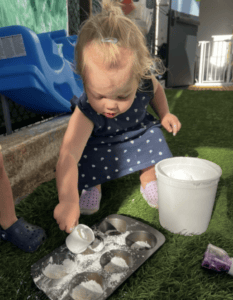
Understanding Play-Based Learning: A Foundation for Growth
Play-based learning is a dynamic and effective way for young children to learn, grow, and develop essential skills. At this stage, toddlers are developing rapidly—physically, emotionally, and cognitively. Through play, they naturally explore the world around them.
Benefits of Play-Based Learning
Play-based learning promotes a holistic approach to development. It nurtures a variety of skills that are crucial for toddlers, including:
- Social Skills: Through play, toddlers learn how to interact with others, share, take turns, and express their emotions. These are foundational skills that will serve them well in preschool and beyond.
- Cognitive Development: Play helps toddlers develop problem-solving abilities, critical thinking skills, and creativity. Through simple games and activities, they learn how to think logically, make decisions, and understand cause and effect.
- Creativity: Play-based activities allow toddlers to express themselves, whether through art, storytelling, or imaginative games. Creativity fosters independence, confidence, and curiosity.
- Emotional Development: Toddlers learn how to manage their emotions, understand others’ feelings, and develop empathy through play. These experiences form the basis for healthy emotional regulation and social understanding.
Why Play-Based Learning is So Important
The importance of play-based learning emerges through multiple essential reasons. The development of toddler activities depends on play-based learning since it provides essential advantages which nurture both cognitive developments along with emotional and social growth. The combination of fun activities during play gives toddlers the chance to build essential life skills essential for academic growth.
Social-Emotional Development
The greatest advantage of play-based learning occurs when it influences the social and emotional development of students. During play children build essential abilities to interact with others while mastering emotion expression alongside empathy development. When children learn sharing methods alongside turn-taking and multiple perspective understanding through play activities they develop essential abilities needed for building positive relationships in the future.
Cognitive Development
Play constitutes an essential factor which supports cognitive development at all levels. Toddlers improve both critical thinking and problem-solving abilities through play activities that include puzzles and block-building and storytelling. Future learning as well as academic achievement builds their foundation through these abilities. Through play activities toddlers develop cognitive thinking abilities that build up their memories and enhance their attention span along with focus skills.
Creativity and Imagination
The imagination-fostering activity of dress-up and imaginative storytelling enables toddlers to use their imaginations thus promoting their creative abilities as well as emotional self-expression. The protected space of this play allows youngsters to freely seek new experiences and make attempts and verbalize themselves safely. Creativity enables young children to solve problems more effectively while teaching them to consider different perspectives in their thinking.
The Connection between Preschool and Home Learning
A play-based preschool design produces settings which encourage students to explore themselves while discovering new things. Learning continues beyond preschool days because your toddler returns home. Home learning reinforces preschool education so that children can construct meaningful knowledge from previous lessons. Your home setting allows you to provide a customized space that enables you to prepare meaningful tactile activities which correspond to your toddler’s present academic domains and early childhood education level.
Key Concepts to Reinforce at Home
Reinforcing key concepts from preschool at home helps toddlers continue their development in a nurturing environment. By incorporating fun and practical activities, parents can strengthen their child’s learning in social, cognitive, and creative areas every day.
1. Social-Emotional Skills
A key aspect of play-based learning is helping toddlers develop social-emotional skills. These skills are crucial for building relationships, managing emotions, and developing empathy. As toddlers engage in play, they begin to understand how to interact with others, communicate their feelings, and recognize the emotions of those around them.
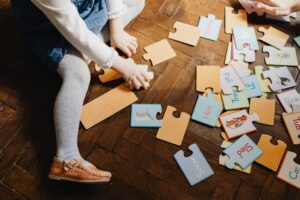
Sharing and Turn-Taking
One of the most important social skills toddlers need to learn is how to share and take turns. While it may be challenging at first, learning to share promotes cooperation and respect for others.
Activity Ideas:
- Building Together: Sit down with your toddler and work together to build something using blocks or other stacking toys. Take turns adding pieces to the structure and celebrate the progress as you work together.
- Sharing During Bath Time: If you have more than one child, bath time can be a great opportunity to practice sharing. Encourage your children to share toys or play together with floating boats, bath books, or cups. Guide them through taking turns and showing appreciation for each other’s actions.
Empathy and Emotional Expression
Being able to express and understand emotions is a vital social-emotional skill. Toddlers often feel strong emotions but may not have the words to express them. Play provides an opportunity to work through these emotions in a safe and supportive environment.
Activity Ideas:
- Feelings with Dolls: Use dolls or stuffed animals to create scenarios where the characters experience different emotions. You could act out scenes like a doll feeling sad because they lost a toy or happy after finding it. This can help your toddler relate to the characters and understand their own emotions.
- Emotion-Themed Play: Encourage your toddler to engage in role-playing with you or with their toys. You might pretend to be a teacher comforting a sad child or a doctor checking on a sick patient. These kinds of imaginative scenarios help toddlers build empathy and practice identifying emotions in themselves and others.
2. Cognitive Development
Cognitive development involves the mental processes of learning, understanding, and thinking. Toddlers are naturally curious, and play-based activities can help them explore, understand cause and effect, and begin to develop problem-solving skills.
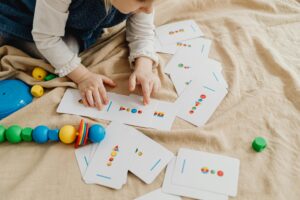
Problem-Solving
Through play, toddlers encounter problems that require creative thinking and decision-making. Whether they’re building a structure, solving a puzzle, or figuring out how to fix a toy, these activities build problem-solving abilities that will benefit them in the future.
Activity Ideas:
- Puzzles: Start with simple, age-appropriate puzzles that have large pieces. Help your toddler solve the puzzle while talking about the shapes, colors, and patterns. As your toddler grows, increase the complexity of the puzzles to challenge their thinking.
- Building with Blocks: Use building blocks to create structures, like bridges or towers. Challenge your toddler to build a structure with specific requirements, such as “Can you make a tower taller than me?” or “Let’s make a house for the dolls.”
Early Literacy and Numeracy
Play is a natural way to introduce early literacy and numeracy concepts. Through songs, reading, and playful counting, toddler development can start developing essential skills that will help them in later years.
Activity Ideas:
- Counting and Sorting: Use everyday objects like buttons, coins, or fruit to practice counting. Ask your toddler to group them by color, size, or shape, which can also help reinforce basic math concepts.
- Interactive Books: Choose books with flaps, textures, or rhymes that encourage your toddler to interact with the story. Books with repetition, like “Brown Bear, Brown Bear, What Do You See?” help toddlers predict what comes next and expand their vocabulary.
- Sing Songs with Rhymes: Singing songs with simple rhymes helps toddlers understand patterns in language. Songs like “Twinkle Twinkle Little Star” or “The Wheels on the Bus” promote word recognition and improve their memory and listening skills.
Sensory Exploration
Sensory activities allow toddlers to explore different textures, smells, sounds, and visuals, which enhances their cognitive and motor development. Sensory play is also a fun way to foster creativity and curiosity.
Activity Ideas:
- Sensory Bins: Fill a shallow container with rice, beans, or sand, and add small toys, spoons, or measuring cups for your toddler to explore. You can also use water beads or water play to engage your toddler’s senses.
- Texture Exploration: Provide materials with different textures, such as soft fabric, smooth stones, or bumpy rubber balls. Ask your toddler to describe what they feel, helping them develop their vocabulary while strengthening their sensory awareness.
3. Creative Expression
Creativity is a fundamental part of play-based learning. By engaging in arts and crafts, imaginative play, and music, toddlers can express themselves freely and build their creative thinking skills.
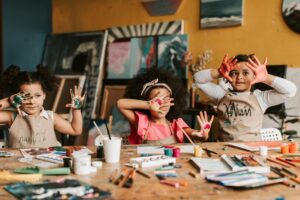
Art and Crafts
Art is a wonderful medium for toddlers to explore colors, shapes, and textures while building fine motor skills. Simple craft activities promote creativity and can also be used to reinforce cognitive and emotional development.
Activity Ideas:
- Finger Painting: Give your toddler finger paints and a large sheet of paper. Encourage them to use their hands to create designs and explore the tactile nature of painting.
- Collage Making: Cut out shapes, pictures, and textured materials from magazines or colored paper and let your toddler create a collage. This activity enhances creativity and fine motor skills as they cut, glue, and arrange the materials.
Imaginative Play
Imaginative play helps toddlers develop their social skills, creativity, and problem-solving abilities. Encouraging your toddler to engage in pretend play provides opportunities for role-playing, storytelling, and emotional expression.
Activity Ideas:
- Pretend Play with Costumes: Have a box of costumes for your toddler to dress up in. They can pretend to be a superhero, a chef, or a firefighter. You can play along, which allows for shared experiences that foster communication and creativity.
- Storytelling with Toys: Create a simple storyline with your toddler using their favorite toys. For example, you could tell a story about a toy car going on an adventure or a stuffed animal visiting the doctor. This helps develop their language skills and storytelling abilities.
Music and Movement
Music encourages physical activity and helps toddlers develop coordination, rhythm, and listening skills. Dancing, singing, and playing musical instruments are fun ways to incorporate movement and creativity into learning.
Activity Ideas:
- Dancing: Put on some music and encourage your toddler to dance. Dancing is an excellent way for them to express emotions and improve motor coordination.
- Making Music: Use simple instruments like tambourines, xylophones, or maracas for your toddler to explore. You can create rhythm patterns and encourage your toddler to repeat them or come up with their own rhythm.
Practical Tips for Parents
As parents, creating a supportive learning environment at home is key to reinforcing play-based learning. Simple adjustments to daily routines and mindful engagement in your child’s activities can significantly enhance their development in fun and meaningful ways. Here are some Parenting tips:
1. Create a Play-Friendly Environment
To support your toddler’s play-based learning, it’s important to create an environment that encourages exploration and creativity. This doesn’t mean you need a dedicated playroom—just a space where your toddler can easily access toys, materials, and space for activities.
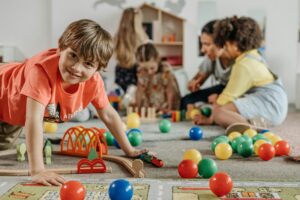
Suggestions:
- Set up a designated play area where your toddler can engage with toys and materials. Use shelves or bins to organize toys by type (e.g., blocks, art supplies, puzzles).
- Rotate toys regularly to keep things fresh and exciting.
- Keep your play area safe and child-friendly. Ensure that materials are age-appropriate and that any choking hazards are kept out of reach.
2. Follow Your Child’s Lead
The beauty of play-based learning is that it allows toddlers to guide their own learning. By following your toddler’s interests and preferences, you help them engage in activities that are both meaningful and enjoyable.
Suggestions:
- Observe your toddler during play and see what captures their attention. If they seem interested in building or drawing, offer materials that will encourage that activity.
- Join in their play to model new behaviors and engage with them. Participate in pretend play or problem-solving challenges to deepen their learning experience.
3. Turn Everyday Activities into Learning Opportunities
There are countless opportunities to reinforce play-based learning throughout your daily routines. Incorporate learning into activities like mealtime, grocery shopping, and cleaning.
Suggestions:
- Grocery Shopping: Ask your toddler to help you count items or identify colors, shapes, and sizes of products in the store.
- Mealtime: Allow your toddler to help with simple tasks like setting the table, stirring ingredients, or sorting food items. You can use these opportunities to talk about numbers, colors, and textures.
4. Limit Screen Time, Promote Active Play
Excessive screen time can hinder toddlers’ development, especially when it comes to social and cognitive skills. Instead, prioritize active play that encourages engagement, creativity, and social interaction.
Suggestions:
- Set clear boundaries for screen time and make it a special activity, rather than a routine part of the day.
- Encourage active play, such as dancing, outdoor play, or creative building activities, to stimulate both physical and cognitive development.
Supporting play-based learning at home offers endless opportunities for toddlers to develop essential skills in a fun and engaging way. By creating a supportive and enriching environment, following your toddler’s lead, and incorporating learning into everyday activities, you can foster a love of learning that will serve your child well in the years to come. If your child is not yet enrolled in a play-based preschool program, consider booking a free tour to learn more about how this educational approach can benefit your toddler.

